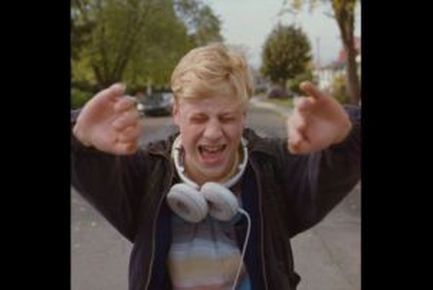Amongst all of Steve's shenanigans, Diane gets closer with a neighbor named Kyla (Suzanne Clement). Where the single-parent family that Kyla lives across the street from is loud and barely keeping it together, Kyla lives in a withdrawn household. She's seen having silent dinners with her husband and daughter, barely able to look at her family. Having struck up a tentative friendship with Diane before Steve's arrival, and being a teacher off on sabbatical, Kyla agrees to watch Steve, a proposition she immediately regrets. However, his abuse triggers an explosion in her and that explosion turns Steve into a cowering, apologetic child. From this leveled playing field, the central threesome is able to ally with each other, as Kyla's supervision allows Diane to find a job and Steve to put his abundant energy into getting Kyla's approval through doing well in her tutoring. As things begin to take a hopeful turn, Dolan builds his film with bubbly pop montages until a transcendent meta moment when Steve, dancing through the streets with his headphones and his skateboard, grabs the edges of the tight frames, and pushes them out to the edge of the screen, the black bars no longer constricting the characters of the film.
That action by Steve, taking place near the halfway point, accurately captures the feeling of watching Mommy. Dolan has fully established how dangerous Steve is when he's not in control, but he's also established how much of a child he is. A simple errand for Steve turns into an adventure, as he can find joy and entertainment in pretty much anything. He can be whimsical as often as he is violent and abusive. When Steve pushes the frames back, it feels earned by all the principals of the film. He's earned it by tamping down his worst impulses, Kyla's earned it by both finding her voice and using it to better her charge, Diane's earned it a thousand times over for being dealt such a tough hand, and the viewer's earned it by enduring the tense sequences of Steve at his worst. Most of all, Dolan's earned this moment by depicting the highs and lows that might mark the upbringing of a child with the kind of problems that Steve has. Mommy lets go of a breath it's been holding for an hour when the frames get pushed back, a visceral filmmaking technique that utterly worked on me.
However, since Mommy tries to live in a place where mental illness is an ongoing concern, the good times can't stay good forever and the frame has to eventually constrict. There are no real cures, just management and adaptation, and when those things fail, the stakes are such that the status quo isn't even the worst place to find oneself. Having given the viewer a moment that thrills and surprises, like Steve has essentially reached out of the screen and released a pressure valve, Dolan proceeds to do the opposite with the second half of the film, forcing characters that he's brought the viewer around on to reckon with the possibilities of their lives. As Steve is leaving the treatment center early in the film, an administrator promises Diane that 'love is not enough.' Dolan nobly tries to find the lie in that statement, but the administrator has the data points necessary to make that kind of assertion while Diane only has one.
Mommy is an exceptional outing from Dolan and all those involved. His talent with montage and formal experiments is riveting, and a late sequence that again messes with the frame is one of the best scenes of 2015. With his guidance, the three main actors each have their moments, all emerging as a superb cast of equals. After one of Steve's outbursts, I wondered if this film had what it takes to make me sympathize with such a character, if that was even its objective in the first place. It had that confidence in spades. One of the purposes of cinema is to generate empathy, and if Dolan can do it for Steve, he knows what he's doing, and I'll watch him take all the risks he wants. A-

 RSS Feed
RSS Feed